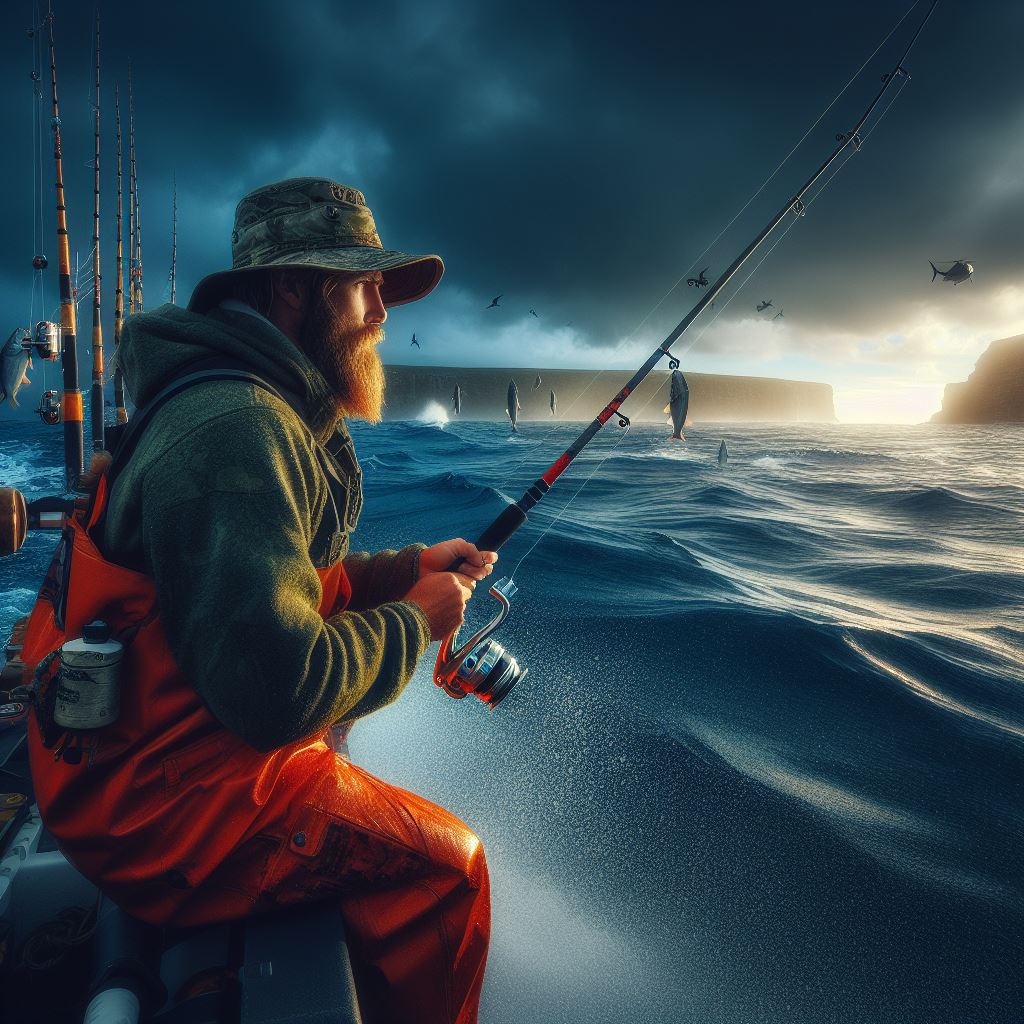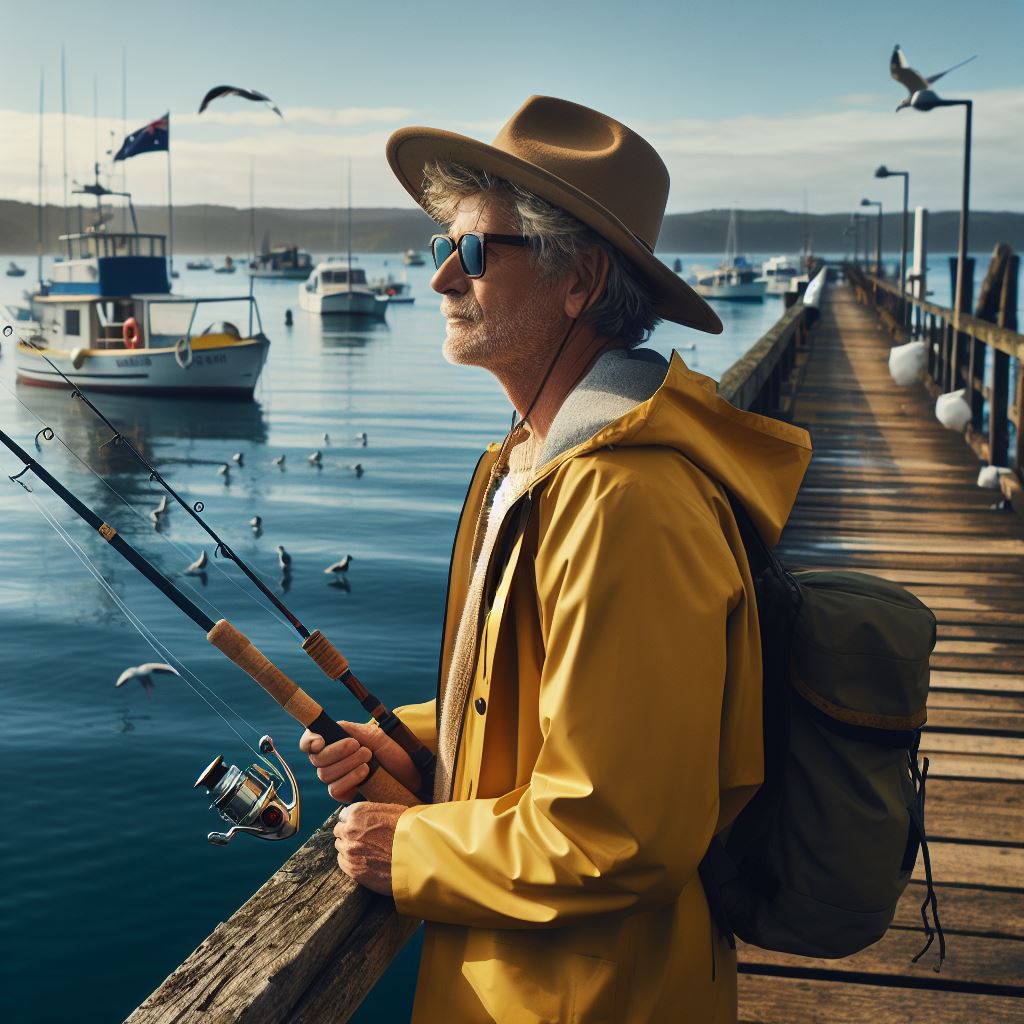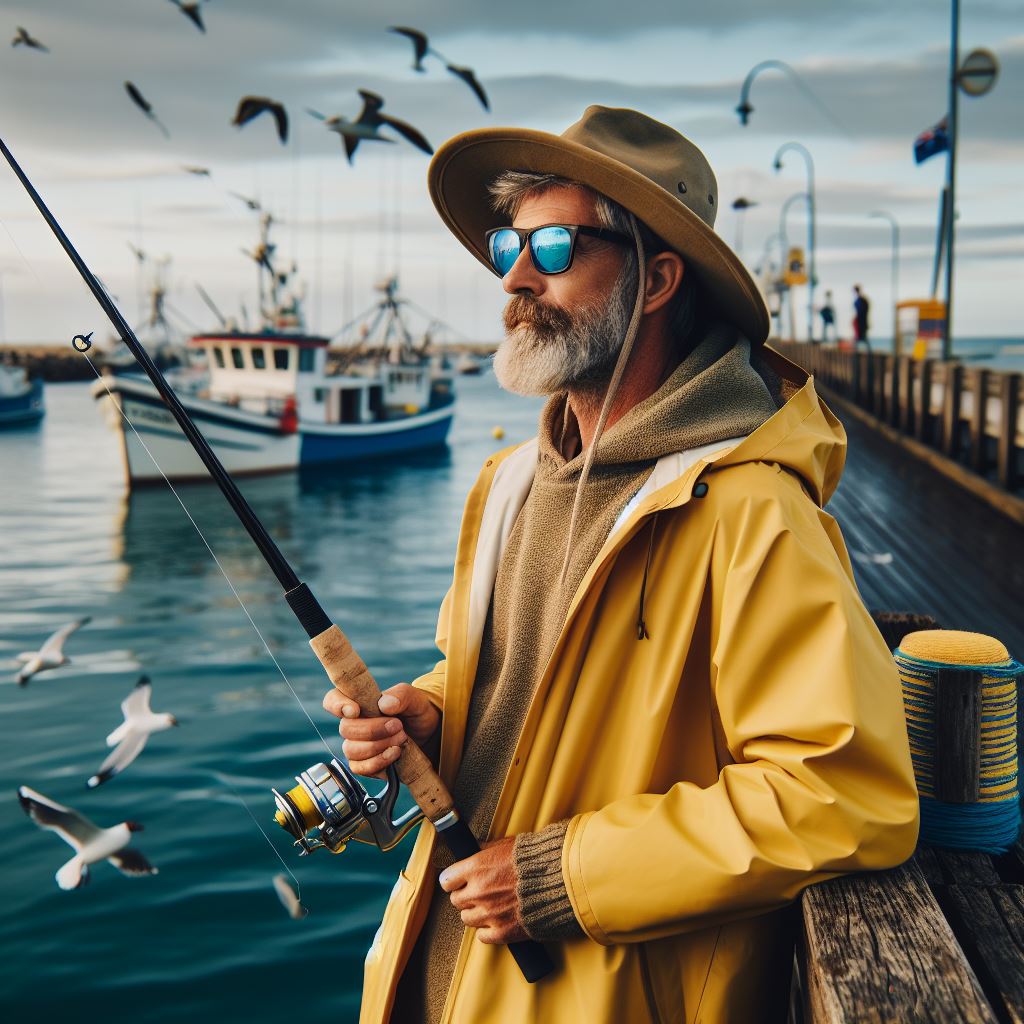Introduction
Both deep sea and coastal fishing are popular activities in Australia, attracting many fishing enthusiasts.
Fishing in Australia has always been a significant industry and recreational activity.
With a vast coastline of approximately 25,760 kilometers, it’s no surprise that fishing plays a significant role in the country’s culture and economy.
The abundance of marine life in Australian waters makes it a popular destination for both deep sea and coastal fishing.
Deep sea fishing involves venturing into the open ocean, away from the coast, in search of larger fish species such as marlin, tuna, and swordfish.
It offers anglers the opportunity to test their skills against powerful and elusive fish found in the depths of the sea.
This type of fishing is popular among thrill-seekers who enjoy the challenge and excitement it offers.
On the other hand, coastal fishing takes place near the shoreline, where anglers target a variety of fish species that inhabit the shallow waters.
This type of fishing is more accessible and suitable for beginners or those who prefer a more relaxed fishing experience.
Coastal fishing allows anglers to enjoy the scenic beauty of the shoreline while catching fish such as snapper, bream, and whiting.
Both deep sea and coastal fishing have their own unique advantages and appeal.
Deep sea fishing provides the opportunity to explore the vastness of the ocean and encounter large pelagic fish.
Coastal fishing, on the other hand, offers a more relaxed and accessible fishing experience, with a chance to catch a variety of fish species.
In review, deep sea and coastal fishing are both popular and important activities in Australia.
Whether you prefer the thrill of offshore adventures or the tranquility of fishing near the coast, there is something for every fishing enthusiast in Australia’s waters.
So grab your fishing gear and get ready to cast your line into the depths or along the beautiful Australian coastline.
Deep Sea Fishing in Australia
Definition and characteristics of deep sea fishing
Deep sea fishing refers to the act of fishing in deep, open waters, far from the coastline. It involves using specialized equipment and techniques to catch ocean-dwelling species.
Locations in Australia known for deep sea fishing
Australia is blessed with various locations perfect for deep sea fishing. Some popular spots include the Great Barrier Reef, Sydney, Cairns, Exmouth, and Port Lincoln.
Deep sea fishing presents numerous advantages for anglers in Australia. It allows them to target larger and more diverse fish species that thrive in deeper waters.
The oceanic environment offers a sense of thrill and adventure, attracting fishing enthusiasts seeking a unique experience.
Advantages of deep sea fishing
- Possibility of catching larger and more diverse fish species: When venturing into the deep sea, anglers have the opportunity to catch a wide range of fish species, including marlin, tuna, swordfish, and shark. These species typically grow larger in deeper waters, offering a thrilling challenge for anglers.
- Thrill and adventure of navigating the open ocean: Deep sea fishing provides an exhilarating experience as anglers navigate the open ocean, facing bigger waves and unpredictable weather conditions. It offers a sense of freedom and excitement that can’t be found in coastal fishing.
- Opportunities for deep sea fishing charters and organized trips: In Australia, there are numerous deep sea fishing charters and organized trips available. These services provide all the necessary equipment, expert guides, and comfortable boats to ensure a successful and enjoyable fishing experience.
Key advantages of deep sea fishing
One of the key advantages of deep sea fishing is the possibility of catching larger fish species.
The open sea provides a habitat for giants like marlin, tuna, swordfish, and shark.
These fish are known for their size, strength, and challenging fighting abilities, making the catch even more rewarding.
Moreover, navigating the open ocean adds an element of excitement to deep sea fishing.
Anglers face bigger waves, unpredictable weather conditions, and the vastness of the sea.
The feeling of being surrounded by endless water and the unknown provides a sense of freedom and adventure that cannot be replicated in coastal fishing.
Australia offers a plethora of locations renowned for deep sea fishing.
The Great Barrier Reef, with its abundant marine life, provides an excellent opportunity for anglers to explore the wonders of the deep.
Sydney, Cairns, Exmouth, and Port Lincoln also boast impressive deep sea fishing grounds, attracting fishing enthusiasts from around the world.
To facilitate deep sea fishing experiences, Australia boasts a wide range of fishing charters and organized trips.
These services offer expert guides who are well-versed in the local fishing grounds and techniques.
Charters provide all the necessary equipment, including top-quality rods, reels, and bait, ensuring anglers have the best chance of success.
Additionally, these organized trips often feature comfortable boats equipped with modern amenities, enhancing the overall fishing experience.
In a nutshell, deep sea fishing in Australia offers a unique and thrilling adventure for anglers.
The opportunity to catch larger and more diverse fish species, the excitement of navigating the open ocean, and the availability of deep sea fishing charters all contribute to making Australia a premier destination for deep sea fishing enthusiasts.
Read: Exploring Permaculture Practices in Australia
Coastal Fishing
Definition and Characteristics of Coastal Fishing
Coastal fishing refers to the activity of fishing in the waters near the coast of Australia.
It involves catching fish species that inhabit the coastal areas, including bays, estuaries, and beaches.
This type of fishing can be done from the shore or using small boats.
Popular Coastal Fishing Spots in Australia
- Sydney, New South Wales: The coastal waters of Sydney offer excellent fishing opportunities. Popular spots include Botany Bay, Port Hacking, and Pittwater.
- Gold Coast, Queensland: Known for its beautiful beaches, the Gold Coast is a paradise for coastal fishing. Some popular spots include Southport Spit, Nerang River, and Currumbin Creek.
- Perth, Western Australia: With its stunning coastline, Perth provides plenty of coastal fishing spots. Swan River, Rockingham Beach, and Fremantle are favorite locations for anglers.
Advantages of Coastal Fishing
- Accessibility and Convenience for Locals and Tourists: Coastal fishing is easily accessible for both locals and tourists. You can find fishing spots along the coastline, making it convenient to indulge in this activity.
- Opportunities for Shore Fishing or Using Small Boats: Coastal fishing allows you to choose between shore fishing or using small boats. Anglers can cast their lines from the beach, jetties, or headlands. Alternatively, they can venture out to deeper waters using small boats.
- Availability of a Wide Range of Fish Species: Fishing along the Australian coast provides access to a diverse range of fish species. Snapper, bream, flathead, tailor, and whiting are popular catches. The abundant marine life ensures a thrilling and rewarding fishing experience.
Coastal fishing appeals to both seasoned anglers and beginners alike.
Its accessibility, combined with the variety of fishing spots and fish species, makes it an attractive option.
Whether you choose to fish from the shoreline or explore the coastal waters in a small boat,
you are sure to find joy in the adventure and the possibility of landing a prized catch.
So, grab your fishing gear, head to the nearest coastal spot, and immerse yourself in the beauty of Australian coastal fishing.
Remember to check local fishing regulations and obtain any required licenses or permits.
Respect the environment and practice responsible fishing to ensure the sustainability of this cherished activity for generations to come.
Read: The Economics of Farming in Australia Unveiled
Differences between Deep Sea and Coastal Fishing
Techniques and equipment used
- Deep sea fishing involves the use of larger boats and specialized equipment.
- Coastal fishing is usually done from smaller boats or even from the shore.
- Deep sea fishing requires the use of heavy-duty rods, reels, and lines.
- Coastal fishing typically involves lighter gear and can be done with spinning reels or even handlines.
- Deep sea fishermen often use techniques such as trolling or bottom fishing.
- Coastal fishermen may employ techniques like casting, jigging, or fly fishing.
Targeted fish species
- Deep sea fishing allows anglers to target larger species such as marlin, tuna, or swordfish.
- Coastal fishing offers opportunities to catch a wide range of fish including snapper, barramundi, or bream.
- Deep sea fishing provides the thrill of battling powerful and elusive ocean predators.
- Coastal fishing offers a chance to catch both game fish and popular table fare.
Potential challenges and risks
- Deep sea fishing can be physically demanding, requiring strength and endurance to handle big fish.
- Coastal fishing can come with its own challenges such as navigating shallow waters and avoiding hazards.
- Deep sea fishing carries the risk of adverse weather conditions and rough seas.
- Coastal fishing may require dealing with tides, currents, and unpredictable coastal elements.
- Deep sea fishing demands knowledge of navigation, marine safety, and emergency procedures.
- Coastal fishing may involve dealing with crowded fishing spots and competing for limited resources.
Fishing regulations and licensing requirements
- Deep sea fishing often requires a specialized license due to the nature of the activity.
- Coastal fishing may be subject to different licensing requirements based on location and target species.
- Deep sea fishing regulations may include catch and size limits to protect marine resources.
- Coastal fishing regulations can vary between states and regions, sometimes including seasonal closures.
- Deep sea fishing charters are often operated by licensed and experienced captains and crews.
- Coastal fishing can be done independently or with the guidance of local fishing guides.
In fact, deep sea fishing and coastal fishing in Australia differ in techniques, equipment, targeted species, challenges, risks, and regulations.
Whether one prefers the thrill of battling large ocean predators or enjoys the variety of fish available closer to the shore, both types of fishing offer unique experiences and opportunities for anglers of all levels.
It is important to understand and adhere to fishing regulations and licensing requirements to ensure the sustainability of Australia’s marine resources.
Read: Indigenous Farming Techniques in Australia

Uncover the Details: Mining Engineers: Key Roles in Aussie Agriculture
See Related Content: Climate Change: AU Enviro Manager’s Response
Factors to Consider when Choosing Between Deep Sea and Coastal Fishing
Skill level and experience of the angler
- Deep sea fishing requires more advanced skills and experience due to challenging conditions.
- Coastal fishing is suitable for beginners or anglers with less experience in fishing.
- Deep sea fishing typically involves bigger and harder-to-handle catches, while coastal fishing offers more variety.
Desired fishing experience and goals
- Deep sea fishing provides the opportunity to catch larger and more prized species such as marlin or tuna.
- Coastal fishing offers a more relaxed and leisurely fishing experience with a wider range of fish species.
- Depending on personal preferences, anglers can choose between the thrill of deep sea fishing or the tranquil atmosphere of coastal fishing.
Budget and cost considerations
- Deep sea fishing trips usually incur higher costs due to the need for specialized boats and equipment.
- Coastal fishing can be more budget-friendly as it often requires basic fishing gear and can be done from shore or small boats.
- Anglers should consider their financial situation and decide which option aligns with their budget.
Time availability and duration of fishing trips
- Deep sea fishing trips are typically longer, ranging from a full day to several days, requiring more time commitment.
- Coastal fishing trips can be shorter and more flexible, allowing anglers to fit fishing into their schedules more easily.
- Depending on the available time, anglers can choose between intense deep sea fishing adventures or shorter coastal fishing outings.
By considering these factors, anglers can make an informed decision on whether to choose deep sea or coastal fishing in Australia.
Taking into account one’s skill level, desired experience, budget, and time availability will help ensure a satisfying fishing trip.
Your Personalized Career Strategy
Unlock your potential with tailored career consulting. Get clear, actionable steps designed for your success. Start now!
Get StartedRead: Farm-to-Table Movement: An Australian Perspective
Gain More Insights: Agricultural Mining Engineering: Aussie Insights
Delve into the Subject: Fishing Gear 101: What Aussie Fishers Use
Personal Experiences and Recommendations
Narratives and stories from experienced deep sea and coastal fishermen
Deep sea fishing has always been my passion. The thrill of venturing into the vast ocean, the anticipation of the unknown, and the sense of adventure it brings is unmatched. I have had countless unforgettable experiences out in the deep sea.
One particular memory that stands out is when I caught a massive marlin after an intense battle that lasted over an hour. The adrenaline rush I felt as I reeled it in was indescribable. It was a symbol of triumph and a testament to my skills as a deep sea angler.
On the other hand, coastal fishing offers a different kind of charm. Being able to cast a line from the serene shores, feeling the peacefulness of the surroundings, and enjoying the simplicity of the activity is what draws many anglers to coastal fishing.
I still remember the first time I caught a snapper while fishing from a rocky coastline. The satisfaction I felt as I proudly held up my catch was pure bliss. Coastal fishing allows you to connect with nature in a more intimate way.
Insights on the pros and cons of each fishing method based on personal experiences
Deep sea fishing provides the opportunity to catch larger and more exotic species such as tuna, marlin, and sharks. The sheer size and strength of these fish make the experience exhilarating, but it also requires more skill and equipment.
Coastal fishing, on the other hand, offers a wider variety of fish depending on the location. From snapper and flathead to bream and whiting, coastal waters are teeming with different species. It is a more accessible and budget-friendly option, especially for beginners.
However, deep sea fishing can be physically demanding, as the rough ocean waves and strong currents make it challenging to maintain stability. It is also more weather-dependent, with trips often being rescheduled or canceled due to unfavorable conditions.
Coastal fishing, although less demanding physically, requires patience and finesse. It may not offer the same adrenaline rush as deep sea fishing, but it allows you to relax and enjoy the tranquility of nature.
Recommendations for beginners or those interested in trying either deep sea or coastal fishing
For beginners interested in deep sea fishing, I recommend joining a charter boat trip. These trips provide all the necessary equipment and expert guidance, ensuring a safe and enjoyable experience.
Be prepared for the possibility of seasickness, and always listen to the crew’s instructions.
Coastal fishing is more accessible to beginners, as it can be done from the shore or a small boat. Start by researching the best spots in your area and learning about local regulations.
Invest in a reliable fishing rod and tackle, and don’t forget to check the tides and weather conditions before heading out.
Regardless of the fishing method you choose, patience is key. Fishing requires time and perseverance, so don’t get discouraged if you don’t catch a trophy fish on your first trip.
Enjoy the process, embrace the beauty of nature, and cherish the moments spent with fellow anglers.
Stand Out with a Resume That Gets Results
Your career is worth more than a generic template. Let us craft a resume and cover letter that showcase your unique strengths and help you secure that dream job.
Get HiredRemember, whether you prefer the thrill of the deep sea or the tranquility of the coast, fishing in Australia offers endless opportunities for adventure and relaxation.
So grab your fishing gear and embark on an unforgettable journey into the bountiful waters of Australia.
Conclusion
Throughout this blog post, we have explored the differences between deep sea and coastal fishing in Australia.
We have learned that deep sea fishing offers the thrill of catching large game fish in open waters, while coastal fishing provides a more relaxed and accessible experience.
If you have a passion for fishing, we strongly encourage you to explore both deep sea and coastal fishing in Australia.
The vast coastline and diverse marine life offer endless opportunities for anglers of all levels of experience.
Australia is truly a fisherman’s paradise, with its abundance of fishing opportunities.
Whether you prefer the excitement of deep sea fishing or the serene beauty of coastal fishing, you are guaranteed to have an unforgettable experience.
In closing, Australia offers a wide range of fishing experiences, each with its own unique rewards.
So why limit yourself to just one type of fishing? Embrace the diversity and richness of fishing in Australia by exploring both deep sea and coastal fishing. Cast your line and get ready for an adventure of a lifetime!




